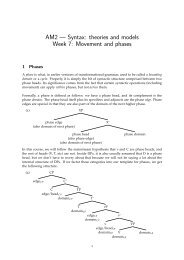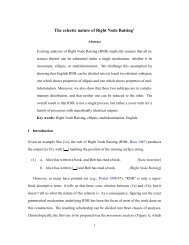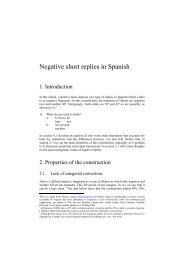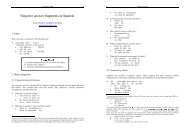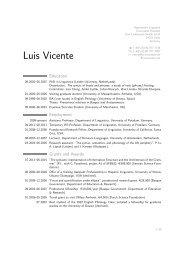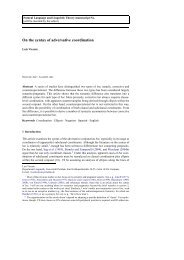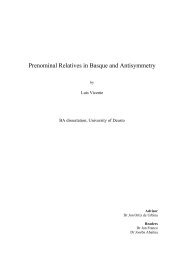Verb fronting in Mandarin Chinese - Luis Vicente
Verb fronting in Mandarin Chinese - Luis Vicente
Verb fronting in Mandarin Chinese - Luis Vicente
You also want an ePaper? Increase the reach of your titles
YUMPU automatically turns print PDFs into web optimized ePapers that Google loves.
Cheng & <strong>Vicente</strong><br />
<strong>Verb</strong> <strong>front<strong>in</strong>g</strong> <strong>in</strong> Mandar<strong>in</strong><br />
UCSC L<strong>in</strong>guistics Colloquium<br />
October 31, 2008<br />
b. haizimen dou qu-le gongyuan<br />
children dou go.asp park<br />
“All the children went to the park (without exception)”<br />
(28) tamen dou mai-le fangzi<br />
they dou buy.asp horse<br />
“They all bought horse(s)”<br />
[no distributive or collective read<strong>in</strong>g required]<br />
Lian is an operator that attaches to the immediate left of the focalized constituent. It def<strong>in</strong>es a set of<br />
alternatives ordered by likelihood (Xiang 2008).<br />
(29) a. * Lian zuotian [ FOC Zhangsan] dou qu gongzou le<br />
lian yesterday Zhangsan dou go work sfp<br />
“Even Zhangsan went to work yesterday”<br />
b. * Lian Zhangsan [ FOC zai fangguan] dou bu chi le<br />
lian Zhangsan <strong>in</strong> restaurant dou not eat sfp<br />
“Zhangsan doesn’t eat even when <strong>in</strong> a restaurant”<br />
The comb<strong>in</strong>ation of lian and dou creates an even read<strong>in</strong>g –specifically, dou asserts that the proposition<br />
<strong>in</strong> question holds for all the alternatives def<strong>in</strong>ed by lian, all the way to the least likely po<strong>in</strong>t of the<br />
scale (cf. Badan 2007).<br />
Sometimes, more than one constituent might appear between lian and dou, <strong>in</strong> which case focus falls<br />
<strong>in</strong>variably on the leftmost one.<br />
(30) a. lian [ FOC zhe-ben shu] ta dou<br />
lian this.cl book he dou<br />
“He has read even this book”<br />
kan-le<br />
read.asp<br />
b. lian [ FOC zhe-ben shu] wo yiwei ta dou kan-le<br />
lian this.cl book I th<strong>in</strong>k he dou read.asp<br />
“I th<strong>in</strong>k that he read even this book”<br />
Three further properties of lian...dou constructions.<br />
• The presence of lian is optional. S<strong>in</strong>ce there is no mean<strong>in</strong>g difference between examples with and<br />
without lian.<br />
(31) ta kan dou mei kan<br />
he look dou not.have look<br />
“He didn’t even look”<br />
We may assume that a silent version of lian is present here, because the even read<strong>in</strong>g surfaces only if<br />
the constituent associated to it receives focal stress (Badan 2007).<br />
(32) a. * Zhangsan dou lai le<br />
Zhangsan dou come sfp<br />
“Zhangsan all came”<br />
b. Zhangsan dou lai le<br />
Zhangsan dou come sfp<br />
“Even Zhangsan came”<br />
7 of 13



